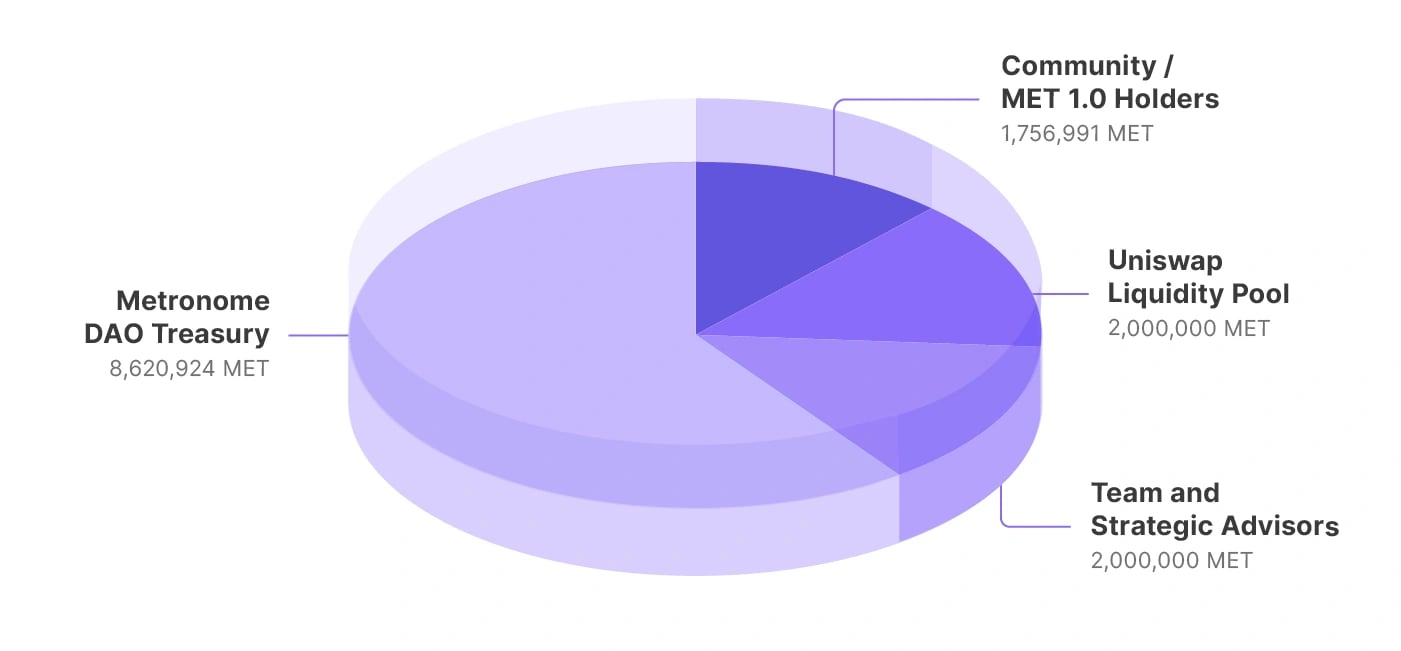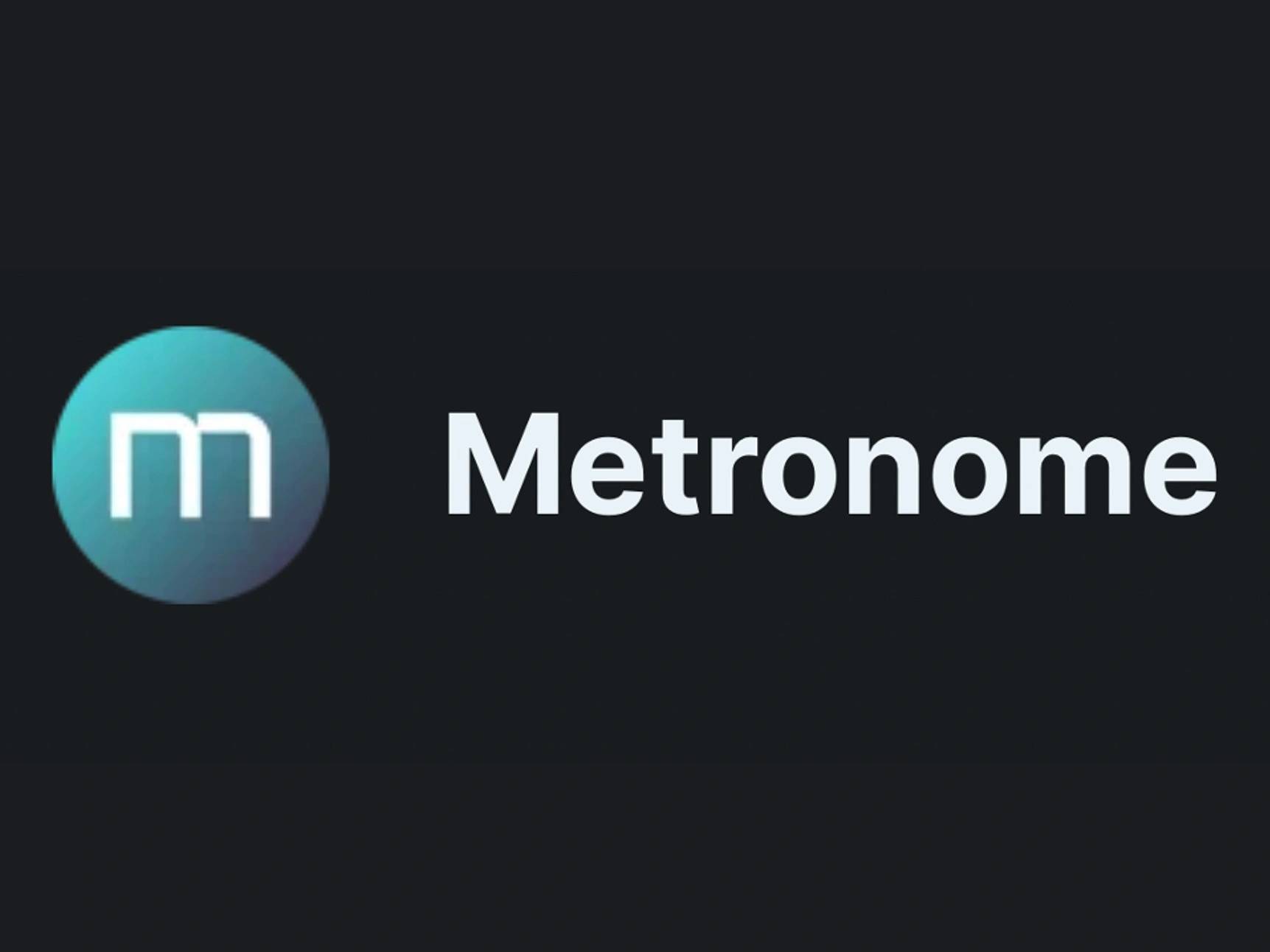위키 구독하기
Share wiki
Bookmark
Metronome
0%
Metronome
**메트로놈(Metronome)**은 다중 담보 합성 자산을 생성하기 위한 탈중앙화 금융(DeFi) 프로토콜입니다. 탈중앙화 애플리케이션(dApp)을 통해 사용자는 다양한 암호화폐 자산을 담보로 예치하여 다른 인기 있는 암호화폐의 합성 버전인 "신스(synths)"를 발행할 수 있습니다. 이러한 자산은 자본 효율성을 위해 설계되었으며, 슬리피지 없는 스왑과 자동화된 수익률 파밍 전략을 가능하게 합니다. [17] [14]
개요
메트로놈을 통해 사용자는 기존 암호화폐 보유량을 담보로 사용하여 자산의 합성 버전을 생성할 수 있습니다. 이 담보는 Vesper Finance의 수익 창출 vToken과 같은 생산적인 자산 또는 ETH, WBTC, DAI 및 USDC와 같은 표준 자산 형태일 수 있습니다. 담보를 예치함으로써 사용자는 합성 자산(msAssets)을 발행할 수 있으며, 이는 메트로놈 Synth 마켓플레이스에서 슬리피지 없이 거래하거나 수익률 파밍에 사용할 수 있습니다. 프로토콜과 그 생태계는 MET 토큰을 통해 메트로놈 DAO에 의해 관리됩니다. 이 프로토콜은 이더리움, 옵티미즘, 베이스 및 플라즈마 네트워크에 배포됩니다. [1] [14] [15]
역사
메트로놈은 2022년에 메트로놈 2.0으로 재출시되었습니다. 이 업데이트된 버전은 메트로놈 DAO에 대한 가치를 창출하고 "메트로놈 2.0 플라이휠"을 활성화하도록 설계된 새로운 기본 요소를 도입했습니다. [9] 업그레이드의 일환으로 새로운 거버넌스 토큰으로의 마이그레이션을 용이하게 하기 위해 2022년 8월 23일에 메트로놈 1.0 토큰 보유자의 스냅샷이 촬영되었습니다. [11]
Metronome Synth
Metronome Synth는 사용자가 담보를 예치하고, 합성 자산을 발행하고, 자신의 포지션을 관리할 수 있도록 하는 핵심 프로토콜입니다.
특징
- 생산적인 담보: Metronome은 사용자가 Vesper 풀 공유 토큰과 같은 생산적인 담보를 활용하여 자본 효율성을 높일 수 있도록 합니다. 이를 통해 사용자는 Metronome Synth의 상품을 활용하면서 담보로 수익을 얻을 수 있습니다. [2]
- 수익률 파밍: 이 프로토콜은 또한 사용자가 예치금을 추가적인 생산적인 담보에 재투자하여 수익률 파밍을 통해 APY를 잠재적으로 높일 수 있는 자동화된 프로세스를 제공합니다. [2]
- 제로 슬리피지 스왑: Metronome 합성 자산은 제로 슬리피지로 거래하거나 스왑할 수 있지만, 거래 수수료는 별도로 명시된 대로 적용됩니다. [2]
- 간편한 UI: Metronome Synth의 사용자 인터페이스는 사용 편의성과 쾌적한 사용자 경험을 보장하기 위해 의도적으로 간단하고 우아한 레이아웃으로 설계되었습니다. [2]
메트로놈 대시보드
사용자는 메트로놈 대시보드를 통해 담보를 예치하고 초기 합성 자산을 생성하며 현재 담보 포지션을 감독할 수 있습니다. [3]
생산적인 담보
메트로놈 사용자는 수익 창출 자산을 담보로 사용하여 합성 자산을 발행할 수 있습니다. 이를 통해 사용자는 담보가 생산적이 되므로 자본 효율성을 높일 수 있습니다. 메트로놈은 Vesper Finance의 특정 풀 토큰을 허용합니다. 지원되는 담보 자산에는 Vesper의 수익 창출 토큰(예: vaETH, vaUSDC) 및 Ether (ETH), Wrapped Bitcoin (WBTC), Dai (DAI), USDC 및 Frax (FRAX)와 같은 기타 표준 암호화 자산이 포함됩니다. [14] [18]
청산 및 담보 비율
합성 포지션을 사용하려면 사용자가 생성하는 합성 자산의 양보다 더 많은 담보를 예치해야 합니다. 담보 자산은 다양한 담보 비율을 가지며, 이는 예치금에서 생성할 수 있는 최대 합성 자산 양을 결정합니다. 합성 자산의 가치가 필요한 담보 비율 아래로 떨어지면 부분 또는 전체 청산이 발생할 수 있습니다. [4]
자산 담보 비율
ETH:
- ETH: 83%
- vaETH: 80%
- sfrxETH: 80%
- vastETH: 78%
- varETH: 75%
- vacbETH: 67%
기타
- WBTC: 80%
Synth 마켓플레이스
Metronome Synth dApp의 Synth 마켓플레이스는 합성 자산의 교환을 용이하게 합니다. 스왑에 참여하려면 사용자는 먼저 담보를 예치하고 Metronome 대시보드를 통해 합성 자산을 발행해야 합니다. 또는 사용자는 Metronome 마켓플레이스에서 스왑을 하기 전에 개방형 시장(예: DEX)에서 합성 자산을 획득할 수 있습니다. [5]
Synth 마켓플레이스에서의 스왑은 슬리피지가 없으며 거래 수수료는 0.25%로 저렴합니다. 이 기능을 통해 사용자는 효과적으로 롱 포지션과 숏 포지션을 모두 생성할 수 있습니다. MET Synth의 유동성은 개별 합성 자산에 설정된 발행 한도에 따라 결정됩니다. 이러한 한도는 플랫폼의 모든 사용자에게 적용되어 특정 합성 자산 또는 게시된 담보에 과도하게 집중되는 것을 방지합니다. [5]
담보 자산은 또한 모든 예금자가 공유하는 글로벌 한도를 준수하며, 이는 시스템 건전성을 유지하기 위한 동일한 목표를 가지고 있습니다. 개인은 담보 요소를 기반으로 자체 유동성 한도를 갖습니다. 사용자는 글로벌 합성 자산 발행 제한 내에서 시장 가격으로 다른 합성 자산과 신스를 교환할 수 있습니다. 이러한 조치는 합성 자산에 불리한 조건(예: 한 합성 자산을 다른 합성 자산으로 교환하는 거래자가 압도적으로 많은 경우)을 방지하기 위해 마련되었으며, 이는 합성 담보를 미결제 발행에서 분리할 수 있습니다. [5]
핵심 합성 자산
메트로놈을 사용하면 msAssets라고 하는 여러 합성 자산을 만들 수 있습니다. 발행할 수 있는 주요 합성 자산은 msETH, msBTC, msUSDC입니다. [14]
Metronome Synth USD (msUSDC)
msUSDC는 미국 달러에 고정된 합성 스테이블 코인입니다. Ethereum, Base, Optimism 및 Plasma에서 사용할 수 있는 멀티체인 자산입니다. 계약 주소는 다음과 같습니다. [16]
- Ethereum:
0xab5eb14c09d416f0ac63661e57edb7aecdb9befa - Base:
0x526728dbc96689597f85ae4cd716d4f7fccbae9d - Optimism:
0x9dabae7274d28a45f0b65bf8ed201a5731492ca0 - Plasma:
0x29ad7fe4516909b9e498b5a65339e54791293234
Metronome Synth USD (msUSD)
Metronome Synth USD (msUSD)는 Metronome 프로토콜 생태계 내에서 생성된 합성 스테이블 코인으로, 미국 달러에 페깅되도록 설계되었습니다. 사용자는 다양한 암호화 자산을 Metronome Synth 프로토콜에 담보로 예치하여 msUSD를 발행할 수 있습니다. 이는 합성 달러로 분류됩니다. [1] [16]
이 자산은 멀티체인 토큰이며 Curve, Uniswap, Aerodrome과 같은 탈중앙화 거래소에서 거래할 수 있습니다. [16]
시장 데이터
2025년 12월 18일 현재, msUSD의 시장 데이터는 다음과 같습니다: [16]
- 시가총액: 23,902,319 달러
- 24시간 거래량: 9,227,755 달러
- 완전 희석 가치 (FDV): 23,275,818 달러
- 유통 공급량: 24,008,889 msUSD
- 총 공급량: 23,379,594 msUSD
- 최대 공급량: 무한대.
컨트랙트 주소
msUSD는 여러 블록체인 네트워크에 배포되었습니다. 컨트랙트 주소는 다음과 같습니다: [16] [1]
- 이더리움:
0xab5eb14c09d416f0ac63661e57edb7aecdb9befa - 베이스:
0x526728dbc96689597f85ae4cd716d4f7fccbae9d - 옵티미즘:
0x9dabae7274d28a45f0b65bf8ed201a5731492ca0 - 플라즈마:
0x29ad7fe4516909b9e498b5a65339e54791293234
스마트 파밍
스마트 파밍은 자동화된 DeFi 수익률 루핑 엔진입니다. 고급 수익률 자동화 기술을 활용하여 복잡한 전략을 통합된 프로세스로 단순화하여 사용자가 루프된 수익률을 얻을 수 있도록 합니다. [7]
사용자는 생산적인 수익 창출 자산, 특히 지원되는 vToken을 예치하여 루프 금액을 설정하고 담보와 동일한 기초 자산을 나타내는 합성 자산을 생성할 수 있습니다. 그런 다음 이러한 합성 자산을 Curve와 같은 지원되는 탈중앙화 거래소에서 원래 기초 자산으로 교환한 다음 Vesper에서 다시 수익 창출 생산 도구로 변환할 수 있습니다. [7]
자동 상환
자동 상환은 메트로놈의 포지션을 언루핑하는 프로세스로, 사용자에게 간단한 상환 방법을 제공합니다. 사용자가 포지션을 언루핑하려는 경우, 상환에 사용할 담보 자산의 수량을 지정할 수 있습니다(해당 달러 가치가 표시됨). 이렇게 하면 상환 후 예상되는 담보 비율과 프로세스 중에 재구매될 합성 자산의 예상 수량이 사용자에게 표시됩니다. [8]
사용자가 스마트 파밍에 사용하기 위해 무담보 담보(예: USDC)를 예치하면 계약은 사용자의 USDC를 Vesper에 할당하여 vaUSDC를 생성합니다. 언루핑 시 Metronome의 Vesper 풀 또는 Vesper 앱을 방문하여 원래 USDC 포지션으로 쉽게 다시 변환할 수 있습니다. [8]
수익 모델
Metronome Synth는 수수료 및 청산과 같은 다양한 채널을 통해 수익을 창출합니다. 생성된 모든 수익은 Metronome Treasury에 할당됩니다. [6]
- Synth 잔액 수수료: 이 수수료는 Synth 프로토콜에서 합성 자산 생성과 관련된 위험을 완화하기 위한 메커니즘입니다. 각 합성 자산은 위험 프로필에 따라 결정되는 고유한 잔액 수수료를 갖습니다. 이 수수료는 연간 기준으로 적용되며 초당 기준으로 적용되어 사용자의 미결제 합성 포지션을 증가시킵니다. Metronome 대시보드에서 각 개별 합성 자산 위에 마우스를 올려 확인할 수 있습니다.
- 마켓플레이스 거래 수수료: 사용자는 Synth 마켓플레이스에서 스왑을 수행할 때 수수료를 지불합니다. 이 수수료는 거래 금액의 0.25%입니다.
- 청산 수수료: 청산이 발생할 때마다 사용자 포지션에는 프리미엄 수수료가 부과됩니다. 이 수수료는 청산인과 Synth 프로토콜 간에 분할됩니다. 현재 청산 수수료는 추가 18%이며, 10%는 청산인에게, 8%는 Metronome에 할당됩니다.
프로토콜 지표
2025년 12월 현재, 메트로놈 신스는 운영 중인 블록체인에서 총 2,010만 달러의 총 예치 자산(TVL)을 보유하고 있습니다. 이 총액 중 약 1,674만 달러는 이더리움에, 257만 달러는 OP 메인넷에, 792,074달러는 Base에 있습니다. 프로토콜은 누적 수수료로 759만 달러 이상을 창출했습니다. [15]
MET 토큰
메트로놈의 기본 토큰인 MET는 이더리움 네트워크의 ERC-20 유틸리티 토큰입니다. MET 토큰은 세 가지 주요 목적을 수행합니다. 첫째, MET는 메트로놈 DAO의 거버넌스 토큰인 esMET를 획득하기 위해 잠길 수 있으며, 사용자는 거버넌스 제안 및 투표에 참여할 수 있습니다. 또한 사용자는 특정 잠금 기간으로 스마트 계약에 MET를 예치하여 MET를 "스테이킹"할 수 있습니다. 보유한 esMET의 양과 선택한 잠금 기간을 기준으로 계층화된 시스템을 통해 사용자는 모든 합성 거래 수수료에 대한 할인을 받게 됩니다. [10]
esMET
esMET는 Andre Cronje가 소개한 ve(3,3) 모델을 따릅니다. 사용자는 MET 토큰을 esMET로 락업할 수 있습니다. 사용자가 $MET를 esMET로 락업하기로 선택하면, 받는 금액은 다양한 요소를 기반으로 계산됩니다. 이러한 요소에는 최대 부스트 (4로 고정), 락업 기간, 최대 허용 락업 기간 (2년 또는 730일)이 포함됩니다. 다른 프로토콜과 달리 esMET는 시간이 지남에 따라 감소하지 않습니다. 따라서 사용자는 최대 혜택을 유지하기 위해 토큰을 다시 락업할 필요가 없습니다. esMET는 양도 가능하도록 (ERC-721 토큰으로) 설계되어 사용자가 직접 보내거나 받을 수 있습니다. [19]
거래 수수료 할인
Metronome dApp 내의 Synth Marketplace에서는 사용자가 합성 자산을 교환할 수 있습니다. 이 마켓플레이스에서의 거래는 슬리피지가 없으며 거래 수수료는 0.25%입니다. 또한, esMET 보유자는 다음과 같은 티어 구조에 따라 수수료 할인을 받을 수 있습니다: [13]
- 500 esMET = 0.20% 수수료 (20% 할인) - 5,000 esMET = 0.15% 수수료 (40% 할인) - 50,000 esMET = 0.10% 수수료 (60% 할인) - 500,000 esMET = 0.05% 수수료 (80% 할인)
최고 티어(80% 할인)를 받으려면 사용자는 500,000 esMET를 보유해야 합니다. 최대 4배의 락업 부스트를 통해 125,000 MET를 2년 동안 락업하면 이를 달성할 수 있습니다.
공급량 분배
메트로놈 2.0으로 마이그레이션하는 동안 메트로놈의 총 공급량은 14,377,915 MET였습니다. MET 2.0 거버넌스 토큰의 공급량 분배를 결정하기 위해 2022년 8월 23일에 메트로놈 토큰 보유자 스냅샷이 촬영되었습니다. [11]

- 커뮤니티/MET 1.0 토큰 보유자 (1,874,178 MET): MET 1.0 토큰 보유자는 1:1 비율로 MET 2.0 토큰을 청구할 수 있습니다.
- Uniswap 유동성 풀 (2,000,000 MET): 2,000,000 MET 2.0 토큰의 초기 할당량은 Uniswap V3 유동성 쌍을 지원하는 데 사용됩니다.
- 팀 및 전략적 고문 (2,000,000 MET): MET 1.0 출시와 유사하게 2,000,000 MET 2.0 토큰이 메트로놈 2.0 창립 팀 및 전략적 고문을 위해 할당됩니다(24개월 베스팅 기간 동안 균등하게 릴리스).
- 메트로놈 DAO 재무 (8,203,669 MET): Autonomous Converter Contract의 전체 MET 1.0 금액에서 스냅샷 시점의 Uniswap 할당량을 뺀 금액은 메트로놈 DAO 재무용으로 지정되었습니다.
거버넌스
메트로놈 프로토콜은 MET 토큰 보유자가 프로토콜의 미래를 지시하는 탈중앙화 자율 조직인 메트로놈 DAO에 의해 관리됩니다. [20] 제안 투표에 참여하려면 사용자는 MET 토큰을 잠가 esMET를 획득해야 합니다. esMET 보유자는 방출 관련 결정에 참여할 수 있습니다. 여기에는 스마트 파밍 부스트 방향에 대한 투표, 부스트 자격 요건을 위한 유동성 및 esMET 요구 사항 설정, 애플리케이션에 추가해야 할 자산 결정, 담보 비율 증가 또는 감소와 같은 프로토콜 관련 문제에 대한 선택이 포함됩니다. [12]
잘못된 내용이 있나요?
